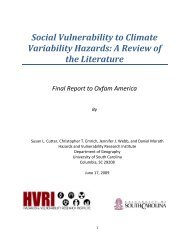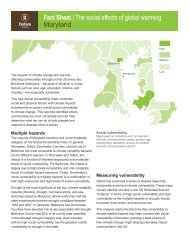Poverty Footprint Study on how the Coca Cola - Oxfam America
Poverty Footprint Study on how the Coca Cola - Oxfam America
Poverty Footprint Study on how the Coca Cola - Oxfam America
You also want an ePaper? Increase the reach of your titles
YUMPU automatically turns print PDFs into web optimized ePapers that Google loves.
It is projects such as this that could lead to a paradigm shift in <strong>the</strong><br />
way businesses and NGOs work toge<strong>the</strong>r. Huge gains can be made<br />
[for development] by <strong>the</strong>se parties working toge<strong>the</strong>r.<br />
Director General of <strong>the</strong> Citizen Ec<strong>on</strong>omic Empowerment Commissi<strong>on</strong>, Zambia<br />
which a growing number of companies recognize <strong>the</strong>y<br />
are an integral part of <strong>the</strong> communities in which <strong>the</strong>y<br />
operate and <strong>the</strong>ir l<strong>on</strong>g-term business success is directly<br />
c<strong>on</strong>nected to <strong>the</strong> success of <strong>the</strong> country as a whole. 18<br />
Many companies are now closely m<strong>on</strong>itoring <strong>the</strong>ir<br />
value chains to ensure resp<strong>on</strong>sible practices and<br />
to transfer knowledge and skills in a more inclusive<br />
approach to <strong>the</strong>ir overall business. Through<br />
microfinance opportunities and training, for example,<br />
local entrepreneurs are given a greater opportunity<br />
to develop successful businesses that can boost<br />
<strong>the</strong>ir household income. This is particularly relevant<br />
for women who, in many developing countries,<br />
form <strong>the</strong> majority of small-scale entrepreneurs in<br />
rural areas 19 and set up <strong>the</strong>ir own enterprises as<br />
<strong>the</strong> <strong>on</strong>ly means by which <strong>the</strong>y can make a living.<br />
There is also an appetite am<strong>on</strong>g many companies<br />
to create innovative business models, products<br />
and services that recognize <strong>the</strong> needs of those<br />
at <strong>the</strong> base of <strong>the</strong> pyramid and which have a<br />
measurable development impact. 20 The provisi<strong>on</strong><br />
of diverse products and services at affordable<br />
prices can both unlock new c<strong>on</strong>sumer markets for<br />
<strong>the</strong> private sector and empower poor people. 21<br />
Increasingly, companies set high standards <strong>on</strong><br />
corporate sustainability and transparency, partly in<br />
resp<strong>on</strong>se to calls from civil society organizati<strong>on</strong>s to<br />
communicate <strong>the</strong>ir practices clearly and with greater<br />
regularity. Fur<strong>the</strong>rmore, <strong>the</strong>re is a growing commitment<br />
to partnerships, which has led <strong>the</strong> private sector to work<br />
directly with civil society and governments to tackle<br />
communities’ most pressing challenges. Companies<br />
that have an improved understanding of <strong>the</strong>ir impacts<br />
<strong>on</strong> communities are better positi<strong>on</strong>ed to support <strong>the</strong>ir<br />
“license to operate” and to accelerate both ec<strong>on</strong>omic<br />
growth and poverty alleviati<strong>on</strong> where it is most needed.<br />
UN Framework <strong>on</strong> Business and<br />
Human Rights<br />
In 2008, <strong>the</strong> United Nati<strong>on</strong>s Human Rights Council<br />
unanimously adopted a framework for business and<br />
human rights that recognizes that all corporati<strong>on</strong>s have <strong>the</strong><br />
“resp<strong>on</strong>sibility to respect” human rights. This resp<strong>on</strong>sibility<br />
requires that companies do not infringe up<strong>on</strong> human rights<br />
through ei<strong>the</strong>r <strong>the</strong>ir activities or relati<strong>on</strong>ships with o<strong>the</strong>r<br />
actors (business partners, suppliers, government bodies).<br />
To meet that obligati<strong>on</strong>, companies must adopt human rights<br />
policies, undertake regular evaluati<strong>on</strong>s of human rights<br />
c<strong>on</strong>cerns in <strong>the</strong>ir operati<strong>on</strong>s and al<strong>on</strong>g <strong>the</strong>ir value chain,<br />
engage with relevant stakeholders, and put in place systems<br />
to avoid negative human rights impacts and to address<br />
grievances from victims. The UN Framework serves as<br />
an umbrella for a range of o<strong>the</strong>r normative standards and<br />
voluntary commitments made by companies covering issues<br />
like labor, livelihoods, water, health and sustainability.<br />
The <strong>Oxfam</strong> <strong>America</strong>, The <strong>Coca</strong>-<strong>Cola</strong> Company<br />
and SABMiller partnership<br />
As businesses gain a deeper insight into <strong>the</strong> impact of<br />
<strong>the</strong>ir operati<strong>on</strong>s <strong>on</strong> poverty and local communities, <strong>the</strong>y<br />
are increasingly collaborating with governments and civil<br />
society to find multistakeholder soluti<strong>on</strong>s to comm<strong>on</strong><br />
challenges. All stakeholders are affected by issues such<br />
as nutriti<strong>on</strong>, educati<strong>on</strong>, lack of regulati<strong>on</strong> and taxati<strong>on</strong><br />
and must <strong>the</strong>refore act toge<strong>the</strong>r to address <strong>the</strong>m.<br />
In 2008, The <strong>Coca</strong>-<strong>Cola</strong> Company, <strong>Oxfam</strong> <strong>America</strong><br />
and SABMiIIer—<strong>on</strong>e of The <strong>Coca</strong>-<strong>Cola</strong> Company’s<br />
major bottling partners and an integral part of <strong>the</strong><br />
value chain—agreed to study The <strong>Coca</strong>-<strong>Cola</strong>/<br />
SABMiller value chain impacts <strong>on</strong> communities in two<br />
developing country markets: Zambia and El Salvador.<br />
The partnership was aimed at understanding <strong>how</strong><br />
communities are impacted by <strong>the</strong> <strong>Coca</strong>-<strong>Cola</strong>/SABMiller<br />
value chain, and to identify <strong>the</strong> opportunities<br />
for enhancing positive impacts and mitigating<br />
negative impacts.<br />
<strong>Oxfam</strong> developed <strong>the</strong> <str<strong>on</strong>g>Poverty</str<strong>on</strong>g> <str<strong>on</strong>g>Footprint</str<strong>on</strong>g> Methodology to<br />
help companies understand <strong>the</strong>ir impacts, make greater<br />
c<strong>on</strong>tributi<strong>on</strong>s to poverty reducti<strong>on</strong> and provide a platform<br />
for dialogue, innovati<strong>on</strong> and accountability. Because<br />
<strong>Coca</strong>-<strong>Cola</strong>® is <strong>the</strong> world’s most valuable brand and<br />
Exploring <strong>the</strong> links between internati<strong>on</strong>al business and poverty reducti<strong>on</strong> 23




